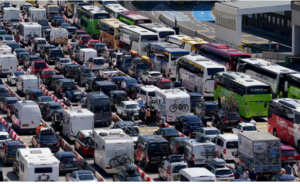Border checks system was due to go live in November but some countries say they are not ready amid worries about lack of testing

Queues for ferries at the Port of Dover. France’s main concern with the new system is congestion in Dover, where British and French border controls take place. Photograph: Gareth Fuller/PA
The full implementation of an EU entry-exit system introducing fingerprinting and facial recognition checks at ports and airports is expected to be delayed again amid fears over congestion and long queues.
Ylva Johansson, the EU’s home affairs commissioner, said recently that the new entry-exit system (EES) would be introduced on 10 November with a contingency of delaying it one week to 17 November.
Johansson had given member states until 5 September to provide the required declaration on their state of readiness.
It is understood three countries, France, Germany and the Netherlands, have written to her to say they will not be ready. They raised concerns about the lack of testing of the system in the field, raising new questions about the target launch date, according to multiple sources.
Sources say UK transport operators were briefed by government officials last week to expect a further delay.
The introduction of the EES has already been delayed twice. It was due to be introduced last summer but France expressed concerns it would have an adverse impact on the rugby World Cup last autumn and this summer’s Olympics.
It was then rescheduled for 6 October this year but put back until November amid concerns congestion would disrupt school holiday visits into the EU from the UK and other non-EU countries.
Several sources stressed that France, the Netherlands and Germany were “fully supportive of the checks” as it will increase security and speed up passport checks for non-EU citizens. One source in France said a “big bang” option on 10 November was just not viable.
France’s main concern is congestion in Dover where British and French border controls take place. Transport operators including the Road Haulage Association, Logistics UK and coach companies have repeatedly warned that the checks will generate huge queues unless they can be done in advance of arrival at the port.
This year, Ashford borough council warned of a worst-case scenario involving delays of up to 14 hours affecting freight traffic and leisure or business car and coach travel.
The EES is being introduced at all entry ports and airports within the Schengen area so also impacts airports across the continent, particularly Schipol, Charles de Gaulle and Frankfurt – three of Europe’s biggest transport hubs – while Germany is also concerned about Cologne and Munich.
Passengers will have their fingerprints or photo of their face taken the first time they arrive in the EU after the introduction of the EES, with electronic verification of biometric data thereafter.
Several sources said they believed the European Commission would prefer not to cancel the launch date entirely but is being asked to consider a phased-in operation or soft launch.
One UK source said: “They could start it but then phase in the time-consuming stuff like fingerprinting but also give operators such as the Port of Dover the freedom to freeze checks if they see queues building up. This is all about capacity to manage congestion,.”
A source in France said: “We only have a small window between November and the Christmas holiday period to get this up and running and then another small window between Christmas and Easter. The problem is the testing has been desktop. We need live testing. Everyone is now waiting for the response of the commission.
“Every single border into the Schengen area will have to operate this. You just cannot do this in a big bang.”
Some feel it is unlikely the commission will backtrack, having announced the launch date so recently, but say they cannot ignore the concerns of the three countries which manage some of Europe’s biggest hub airports. The Netherlands is also responsible for the continent’s largest port, Rotterdam.
The commission was approached for comment.

